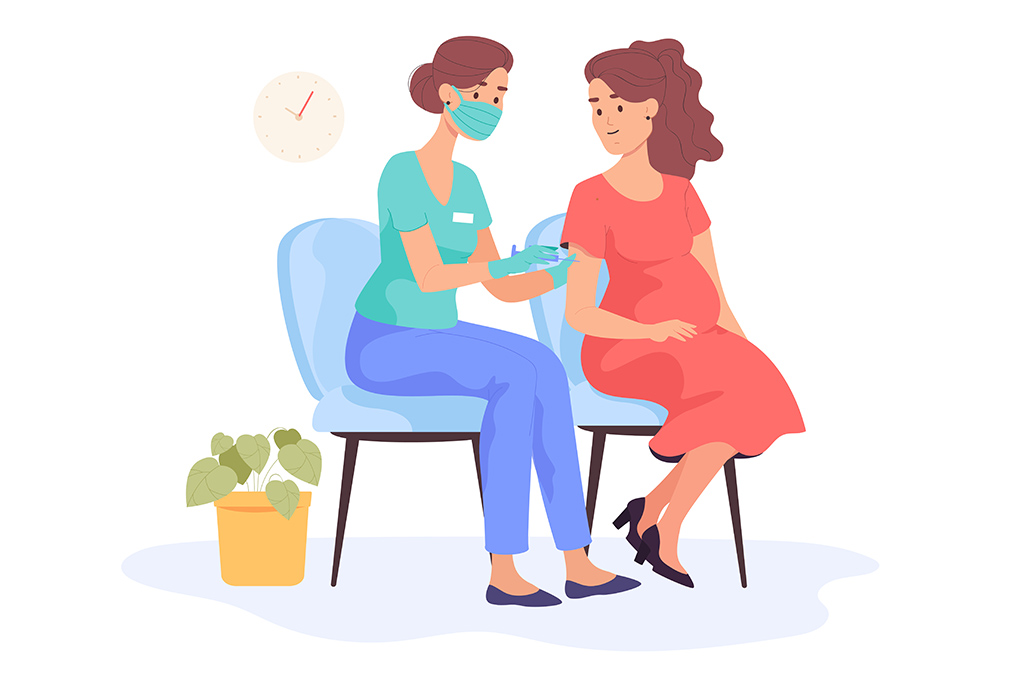By Kai Curry
NORTHWEST ASIAN WEEKLY
Amidst the myriad concerns and decisions that accompany pregnancy, one crucial aspect has become increasingly apparent in recent times: the importance of COVID-19 vaccination for expectant mothers.
The number and timing of these vaccinations have an impact on COVID-19 antibodies (anti-Spike antibody) in newborns, a new study found. For optimum protection of newborns against the virus, a University of Washington (UW) Medical study released on Jan. 19 says that mothers should have had more than the two preliminary COVID-19 vaccines—in other words, they should have had some booster and/or the 2023-2024 shots, and that they should receive their most recent or “last” vaccine during pregnancy.

Dr. Vicky Hwang
But anytime is a good time to get vaccinated, said Dr. Vicky Hwang, an obstetrician and gynecologist at Valley Medical Center.
“I recommend it to everybody at any point during the pregnancy.” She added, “If you’re due for a booster, or haven’t been vaccinated before, I recommend it.”
Hwang, who works at the Valley Women’s Healthcare Clinics in Auburn and Renton, grew up in Bellevue, earned her medical degree from Loyola University Chicago, and completed her residency with a specialty in OB/GYN, at John Peter Smith Hospital in Fort Worth, Texas.
She reassures expectant mothers that COVID-19 vaccines pose minimal risk to both mother and baby, contrary to misconceptions surrounding vaccination during pregnancy.
“We know that [the vaccine] protects the mom against severe disease. This study adds to more emerging evidence that getting the vaccine during pregnancy can confer immunity to the baby and add some protection to the baby in those first weeks of life when they don’t have good immunity and can’t fight on their own.”
According to Hwang and the study, whose lead author is Dr. Alisa Kachikis, a UW Medicine maternal-fetal medicine specialist, the first two COVID-19 vaccines do provide some protection to the mother and the baby.
However, the protection jumps incrementally if the mother has “three or more” COVID-19 vaccines, to “10 times more” protection. Hwang added that, it didn’t seem to make any difference whether the babies were born to term or preterm, another important consideration.
The study suggests that, in order “to optimize protecting the baby,” the best time to get a COVID-19 vaccine/booster is in the third trimester of pregnancy, a period when physicians already recommend TDAP (tetanus, diphtheria, and pertussis, also known as “whooping cough”).
“That’s pretty routine,” said Hwang. However, “the practice of the COVID-19 vaccine [during pregnancy] is not routine right now. It’s something that we might think about that might become a recommendation.”
But what are the risks if an expectant mother isn’t vaccinated for COVID-19 or has COVID-19 during pregnancy?
 “If the mom has active COVID-19 at the time of delivery, the baby [could be] born with respiratory issues,” Hwang said. Also, “we’ve seen some inflammatory effects on the placenta at delivery sometimes.”
“If the mom has active COVID-19 at the time of delivery, the baby [could be] born with respiratory issues,” Hwang said. Also, “we’ve seen some inflammatory effects on the placenta at delivery sometimes.”
Another possibility is that the baby will get COVID-19 from the mother after birth “through contact with the mother immediately after delivery.” In that regard, a newborn is just as susceptible as anyone else to getting the coronavirus from “respiratory droplets,” Hwang reminded.
“We don’t know long-term effects on the baby,” she said—that is yet to be fully studied. “But we know if you get COVID-19 when pregnant, the baby [might] end up being smaller than expected.”
Hwang said most mild infections go through without further pregnancy complications.
She emphasized the need for vigilance and proactive measures at home during pregnancy, to safeguard maternal and infant well-being.
“Frequent hand washing, wiping down surfaces, thoroughly cooking your meals,” and in general being “just a little bit more careful” are what Hwang advises “for any pregnancy.”
Addressing prevalent hesitancy towards vaccination, Hwang acknowledged the diverse array of concerns voiced by some patients—from systemic distrust of medical interventions to ideological aversions. It’s important to foster open dialogue, she said, and provide evidence-based information to alleviate anxieties surrounding vaccination.
Hwang wants to overcome barriers to vaccination and ensure the optimal health outcomes for both mother and child, by empowering expectant mothers with accurate information and guidance.
Learn more about COVID-19 and pregnancy by visiting the Washington Department of Health website (available in multiple languages).
Kai can be reached at info@nwasianweekly.com.
Made possible in part by the Washington State Department of Health through a grant from the Centers for Disease Control and Prevention. This information does not necessarily reflect the official policies of the Washington State Department of Health or the Department of Health and Human Services.

